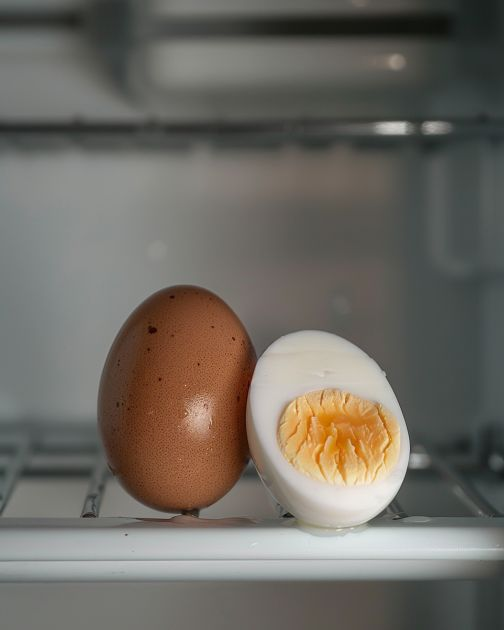Eggs are a versatile kitchen staple enjoyed worldwide for their nutrition and adaptability in countless recipes. But when it comes to storing hard-boiled eggs, especially in the refrigerator, the question arises: Should you peel them before storing, or leave the shells intact? This seemingly simple debate holds surprising nuances that can affect the eggs’ taste, texture, shelf life, and even safety. Let’s break down the best practices for storing hard-boiled eggs and discover the reasoning behind them.
Why Proper Egg Storage Matters

Eggs, whether raw or cooked, are perishable. Improper storage can lead to food waste, compromised quality, and even foodborne illnesses. Hard-boiled eggs, in particular, require careful handling because cooking removes the natural protective coating found on raw eggs, making them more susceptible to spoilage.
Whether to peel hard-boiled eggs before storing depends on a few key factors, including freshness, convenience, and safety.
Understanding the Debate: To Peel or Not to Peel?
When storing hard-boiled eggs, the condition in which they are kept significantly affects their quality. Leaving the shells on or removing them each has distinct advantages and drawbacks. Let’s examine the key aspects of this debate.
Unpeeled Hard-Boiled Eggs: The Protective Option
Leaving the shell on a hard-boiled egg offers several benefits:
- Natural Protection: The eggshell acts as a natural barrier, shielding the egg from bacteria and reducing moisture loss. This can help maintain the egg’s freshness longer.
- Odor Prevention: Refrigerators often harbor a mix of aromas from other foods. The shell helps prevent the egg from absorbing these odors, preserving its taste.
- Extended Shelf Life: Hard-boiled eggs stored with their shells can last up to a week in the refrigerator when properly cooled and stored.
However, storing eggs unpeeled may not be as convenient if you’re planning to use them for meal prepping or quick snacks.
Peeled Hard-Boiled Eggs: The Convenient Choice
Peeling hard-boiled eggs before storage can save time later, but it comes with some caveats:

- Immediate Convenience: Peeled eggs are ready to eat or use in recipes without any extra steps, making them ideal for busy schedules or meal prepping.
- Moisture Loss: Without the protective shell, peeled eggs are more prone to drying out. They need to be stored in a tightly sealed container or submerged in cold water to retain moisture.
- Increased Risk of Bacteria: Removing the shell exposes the egg to potential contaminants. Peeled eggs should be consumed within 2-3 days for optimal safety and quality.
General Guidelines for Storing Hard-Boiled Eggs
For the best results, follow these storage tips based on whether you choose to peel or leave the shells on:
- Unpeeled Eggs: Store in a covered container or an egg carton in the refrigerator. Ensure they are fully cooled before refrigeration to avoid condensation, which can promote bacterial growth.
- Peeled Eggs: Place in an airtight container or submerge in a bowl of cold water. Change the water daily to maintain freshness and prevent spoilage.
The Science Behind Shelf Life
Hard-boiled eggs stored with their shells intact can last up to one week in the fridge. Peeled eggs, on the other hand, should ideally be eaten within 2-3 days. The difference lies in the natural protection offered by the shell, which slows down bacterial contamination and moisture loss.
If you’re unsure whether your eggs are still good to eat, perform a quick inspection. Discard eggs with an off smell, slimy texture, or unusual appearance.
Culinary Uses: Tailoring Storage to Your Needs

How you store hard-boiled eggs may depend on how you plan to use them:
- For Snacking: Peeled eggs are convenient for quick bites but require careful storage to stay fresh.
- For Recipes: If you’re planning to chop eggs for salads or mash them for deviled eggs, peeling ahead of time can save preparation time.
- For Longevity: If you’re not planning to use the eggs right away, leaving the shells on is the safest option to maximize shelf life.
Safety First: Avoiding Foodborne Illness
Proper storage is crucial for preventing foodborne illnesses. Follow these key safety tips:
- Cool Quickly: After boiling, place eggs in an ice bath to bring them to room temperature quickly. This prevents bacteria from thriving.
- Refrigerate Promptly: Always store hard-boiled eggs in the fridge within two hours of cooking.
- Monitor Temperature: Keep your refrigerator at or below 40°F (4°C) to maintain food safety.
Personal Preferences and Practicality
For some, the choice between peeled and unpeeled storage comes down to personal habits and lifestyle. Busy households may prioritize convenience, while others may value the longer shelf life of unpeeled eggs. Either way, the goal is to balance practicality with safety and freshness.
Conclusion: Choosing What Works Best for You
When it comes to storing hard-boiled eggs, both peeled and unpeeled options have their merits. If you prioritize freshness and extended shelf life, leaving the shells on is the way to go. On the other hand, if convenience and quick access are more important, peeling the eggs before storage can be a practical choice—just remember to store them properly to maintain their quality.
Ultimately, the best method depends on your individual needs and how you plan to use the eggs. By following proper storage techniques, you can enjoy the delicious versatility of hard-boiled eggs without compromising safety or taste.


